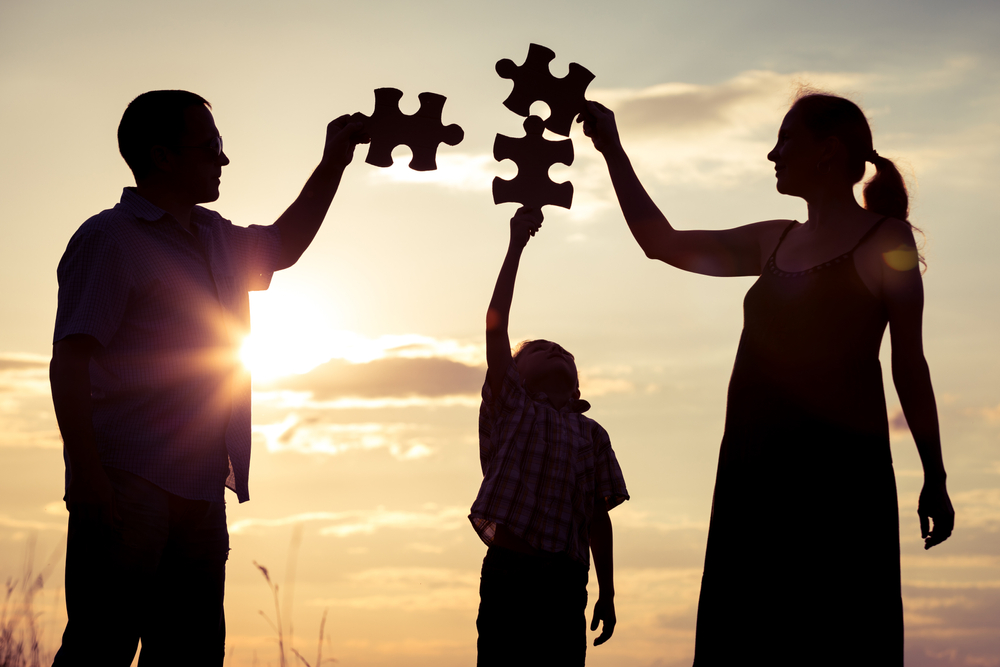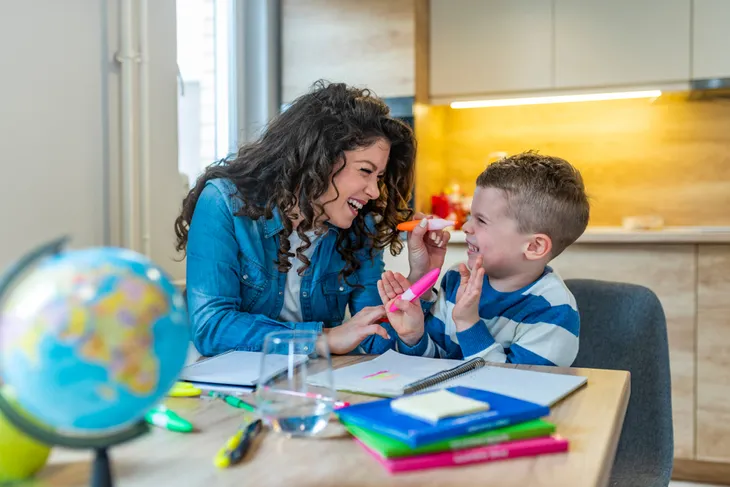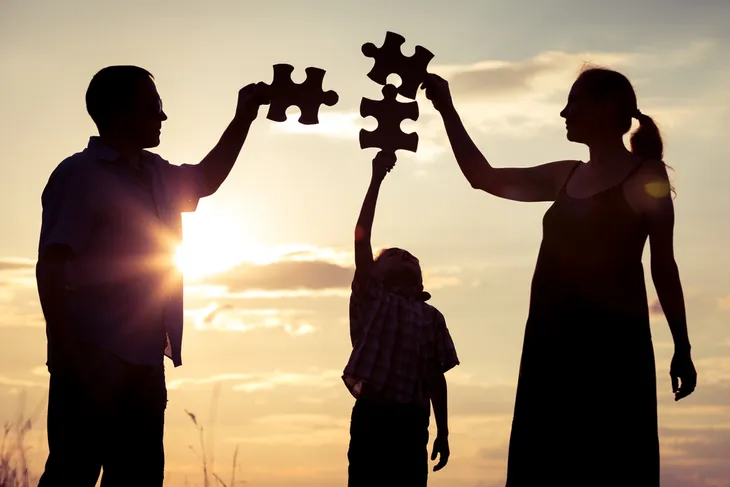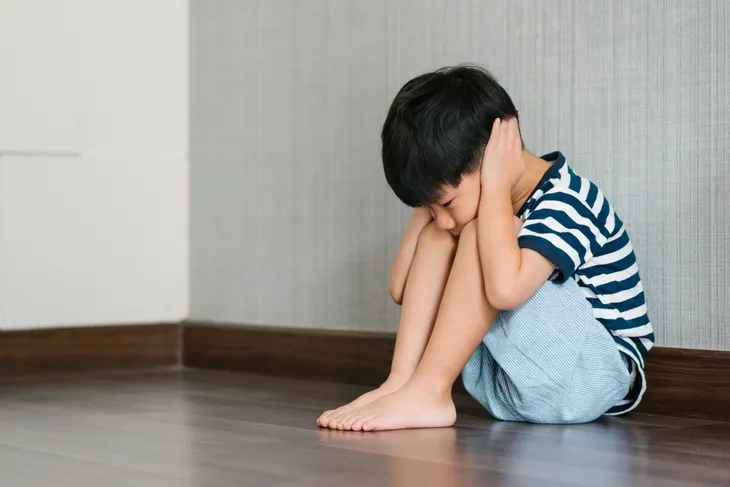When it comes to being both an autistic adult and a mother to autistic children, there are many struggles as well as benefits. Our family consists of six neurodiverse individuals, with me and three of our children having autism diagnosis. People often feel sorry for us. Others respond with comments wondering why we would keep having children knowing the others are autistic. A few have even been baffled to find out that someone with autism can have children.
While our family dynamic is far from perfect, it is incredible. Our children talk to us about everything, both the good and the bad. We accept each other as we are while pushing each other to grow and learn. We love, we laugh, we cry, and we annoy each other, just like any other family.
We’re Different
What might set us apart, are that there are things you will find in our home that you might not find in yours. We have visual schedules throughout our home. There are charts with emotions that can be pointed to when we cannot express those verbally. Each room has its own calm down corner with sensory toys, noise canceling headphones, time timers, and other tools throughout.
As a child, I knew I was different. However, I was not sure why or what that difference was. It was not until the age of thirty-three that I understood: I am autistic. Like many women my age, autism was a diagnosis that was unheard of for girls. Autism was not even a word in my vocabulary until the age of 15.
The one thing I did know, even from an early age, was that I was going to be a mother and a writer. I knew I wanted daughters so that I could dress them in matching pink dresses. The picture in my mind of being a writer included sitting in front of an antique typewriter, typing away. While my journey to achieve those life, accomplishments was rather different than what I imagined, I did reach those goals and then some.
Genetic Predisposition
For those who wonder why we would have children knowing that we have a genetic predisposition to autism, well, that answer is complex.
Our story is unique in more ways than just the amount of autism cases. We did not know we were a family with four autism diagnosis until after my youngest child was born. Our son received his diagnosis at 23-months, youngest daughter at 8-years-old, middle daughter at 11-years-old, and me at 33. And in that consecutive order. (For more information, check out Early Signs of Autism in Babies).
While we did not know prior, I can honestly say I would have had my children regardless. None of us can predict the future of what disorder our child might have, nor go back to change anything. Do I wish my children could be free of autism? Absolutely! No one wants their child to struggle with autism or any other disorder. While we cannot change these things, we can love and accept the children we have.
People with Autism CAN Have Children
Though that question is outlandish, the third question is genuinely mind-boggling. Being autistic does not affect the ability to have children. How significantly someone’s autism affects their ability to parent depends on the individual, just as it would a neurotypical person. (Here are more Common Myths and Misconceptions About Autism).
Being an autistic mother with autistic children means facing many challenges. These are the same challenges that neurotypical mothers with autistic children face. I, too, face the challenges autistic parents of neurotypical children face. Those who have multiple children on the spectrum, I face those as well. My story is the combination of all those, but I am not alone, and neither are you.
Learning to Balance
When it comes to having autistic children while being autistic, the key is learning to balance the needs of your family as a whole. You cannot leave out caring for anyone, including yourself if you want the house to run relatively smoothly.
Challenge: Sensory Overload
One of the biggest struggles we face daily is sensory overload. While we are all four autistics, each of our autism presents differently. Our son is sensory seeking. Though he is only five, he is the size of a 7- or 8-years-old and is strong as all get out. He crashes into couches, walls, and people to get the sensory input he needs. When he is upset, he pinches either his skin or mine. He is loud, strong, and has extreme likes and dislikes.
My daughters are different, and that includes from each other. Our youngest daughter is also sensory seeking and loud but does so in smaller forms such as twirling and hugs. While she seeks sensory input when overwhelmed, she cannot handle unexpected touch or noises. Our oldest autistic child is quiet, sensory avoiding, and truly likes most anything. Though she is drastically different in daily aspects, her meltdowns are often the most severe.
Triggers
What triggers one child is often another child having a meltdown. Many parents see this scenario, especially those with multiple children with disabilities. Being autistic does not exclude me from this, but it does complicate the situation. When there is a substantial amount of crying or screaming, I find myself overwhelmed. While I try my best to respond correctly, there are times that I yell or cry myself. Just like my children, I cover my ears or shake when surprised.
Working through the zones of regulation, visual schedules, fidgets, breathing exercises, and sensory breaks, we work to prevent getting to meltdowns. Those skills are ones that I have to practice and learn for myself, all while teaching them to my children. Learning self-regulation and flexibility is a must. However, they are skills that are learned through continual practice and throughout life.
Being an autistic mother of autistic children is complicated—the biggest thing I have to give my children, though, is my experience. I can relate to them, understand their struggles, and can help them thrive which is what any parent would want the relationship with their child.









